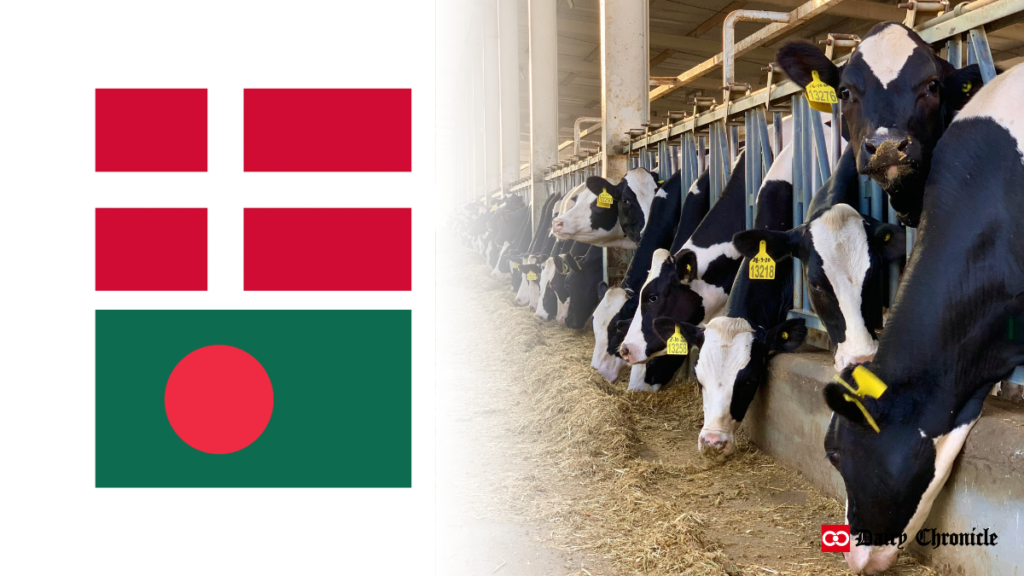Denmark funds a groundbreaking dairy project in Bangladesh aiming to create a sustainable and productive dairy value chain. The initiative targets a 30% reduction in greenhouse gas emissions and a 30% increase in farmer income for 10,000 households.
Denmark is taking a significant step towards promoting sustainable dairy practices in Bangladesh with its funding of the “Green Dairy Partnership in Bangladesh” project. This initiative, valued at approximately Tk25.4 crore (DKK 25.5 million), aims to create a green, commercially viable dairy business model in Southwest Bangladesh. The project was officially launched in Dhaka and is set to have a transformative impact on the region’s dairy industry.
Project Overview and Goals
The Green Dairy Partnership project is designed to advance sustainable dairy farming practices while enhancing economic opportunities for local farmers. Key goals of the project include:
- Reducing Greenhouse Gas Emissions: The initiative targets a 30% reduction in greenhouse gas emissions across the dairy value chain.
- Increasing Farmer Income: The project aims to boost income for 10,000 farmer households, with the potential to scale to 50,000 households.
- Promoting Gender Equality: The project has a strong focus on empowering women, with the ambition to ensure that 80% of the targeted farmers are women.
Sustainable Practices and Innovations
The project will introduce a range of sustainable practices to streamline milk collection and processing. By integrating Danish expertise through the BIG FIVE concept—focused on feed efficiency, feed balance, animal robustness, manure handling, and efficient land use—the initiative aims to achieve a 25% reduction in greenhouse gas emissions. An additional 5% reduction will be targeted through process optimization, including improvements in energy use, food waste management, and packaging.
Key Partnerships and Stakeholders
The Green Dairy Partnership project is a collaborative effort involving several key players:
- Danida Green Business Partnership (DGBP): Funded by the Ministry of Foreign Affairs of Denmark, DGBP is supporting the project’s implementation.
- Solidaridad Network Asia: The project is administered by Solidaridad Network Asia, which will oversee the development and management of the initiative.
- Pran Dairy: As the main commercial partner, Pran Dairy will work closely with farmers to enhance productivity and implement sustainable practices.
- Arla Foods Bangladesh and SEGES Innovation: These partners will bring Danish expertise in sustainable dairy farming to the project.
- IDRN-Bangladesh Agricultural University and The Danish Agriculture & Food Council: These organizations will contribute to research and guidance for the project’s green transformation efforts.
Impact and Future Outlook
The Green Dairy Partnership project is expected to deliver substantial benefits, including:
- Enhanced Dairy Quality: By introducing sustainably produced dairy products to the market, the project aims to improve the overall quality of milk available in Bangladesh.
- Economic Development: The increase in farmer income and the focus on gender equality will contribute to the economic development of the region.
- Environmental Benefits: The reduction in greenhouse gas emissions and the adoption of green practices will support Bangladesh’s environmental sustainability goals.
Statements from Stakeholders
Ahsan Khan Chowdhury, Chairman & CEO of Pran-RFL Group, highlighted the collaborative efforts with dairy farmers across Bangladesh to create a sustainable and productive dairy value chain. He emphasized the project’s focus on training farmers and improving various aspects of dairy farming.
Irene Quist Mortensen, Head of International Sustainability at Arla Foods, expressed pride in the project’s potential to support Bangladesh’s dairy sustainability and self-sufficiency goals, as well as contribute to CO2 emissions reduction.
Selim Reza Hasan, Country Manager at Solidaridad Network Asia, underscored the importance of safe and sustainable food for Bangladesh’s prosperity. He noted that the project is developing a business case for both farmers and the private sector, aiming to produce quality milk that is carbon neutral.
Denmark’s Green Dairy Partnership project represents a significant investment in the future of Bangladesh’s dairy industry. By focusing on sustainability, gender equality, and economic development, the project is set to create a model for green dairy practices that could inspire similar initiatives worldwide.



